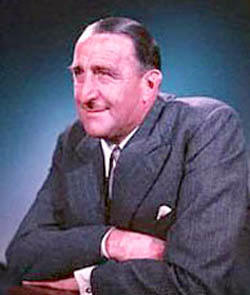J. ARTHUR RANK
METHODIST FILM PIONEER
 When you hear
his name, what comes first to mind? The man hitting the gong to signify
the start of an exciting film? The films themselves, those black and
white classics, such as Brief Encounter or Great Expectations, or the
early colour films? Or perhaps the chain of Odeon cinemas? For many
years the name of J. Arthur Rank was synonymous with British cinema.
When you hear
his name, what comes first to mind? The man hitting the gong to signify
the start of an exciting film? The films themselves, those black and
white classics, such as Brief Encounter or Great Expectations, or the
early colour films? Or perhaps the chain of Odeon cinemas? For many
years the name of J. Arthur Rank was synonymous with British cinema.
And yet he started his career in film making relatively late, already in his forties when he made his first film. He was a member of a very wealthy Methodist flour milling family in Hull, the ‘Rank’ in Rank Hovis McDougall today, and after an unsuccessful business venture of his own worked for his father. He developed an interest in film through his use of the medium in Sunday School teaching in which the Methodist Church was something of a pioneer. He soon saw the potential for reaching wider audiences and set to work making his own films, perhaps in part in response to a ‘put your money where your mouth is’ challenge by the London Evening News after an article had appeared in the Methodist Times regretting the influence of the cinema on family life. He set up RFL (Religious Films Ltd) to make films to be shown in cinemas and used in church services. An early film contained shots of the Minister and congregation at the Ideal Cinema in Lambeth, which was unique in that it showed commercial films from Monday to Saturday, but held services on Sundays - using film, of course! The company was active into the 1970s making films and prints to send out to churches and providing circuits with projectors so that the films could be shown more widely. As television began to take on the role and the influence of the cinema the organisation set up the Churches Television Training Centre to prepare for the challenges of the new medium.
Of course J. Arthur Rank did not confine his interests to religious film making. He was a shrewd businessman, quick to recognise and seize opportunities and he expanded his empire to include studios in which to make a wide range of films, including the Carry On films, and cinemas in which to show them, becoming a very wealthy man. But he remained true to his Methodist roots. In 1953 the first British film to be made in the new Eastman Colour was a biography of John Wesley. In the same year he set up the J Arthur Rank Group Charity to promote Christian belief. Today this is the Rank Foundation, with the triple aims of encouraging and developing leadership among young people, supporting the disadvantaged, the frail and the elderly - and, as from the very beginning of the Rank empire, promoting Christian principles through film.
Libby Stone